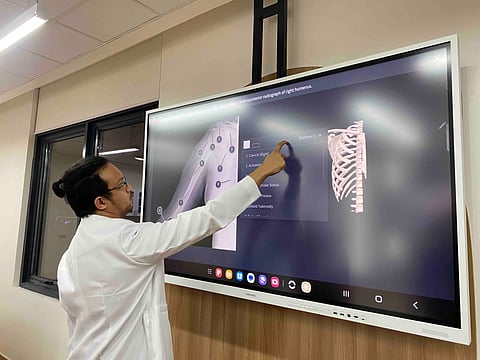
- NEWS
- the EDIT
- COMMENTARY
- BUSINESS
- LIFE
- SHOW
- ACTION
- GLOBAL GOALS
- SNAPS
- DYARYO TIRADA
- MORE

Mapúa University has launched its School of Medicine, offering students advanced learning spaces aimed at transforming the future of healthcare in the Philippines.
Located in Intramuros, the new School of Medicine is equipped with state-of-the art practical simulation rooms, virtual and synthetic human patients, and augmented reality technology, providing students with an immersive and hands-on learning experience.
As the only University in the Philippines partnered with Arizona State University (ASU)—ranked the No. 1 “Most Innovative School” in the U.S. by U.S. News & World Report—Mapúa is committed to shaping future medical professionals with the skills, knowledge, and resources needed to revolutionize medical education in the country.
“The introduction of the Mapúa University School of Medicine, through our collaboration with Arizona State University, is a significant milestone for the University, as the School helps improve access to world-class healthcare education,” said Mapúa University president and CEO Dr. Dodjie Maestrecampo on Thursday at the School’s launch.
A special three-day training session, provided by the ASU Consortium, was conducted for the faculty of the School of Medicine to ensure they are proficient in the pedagogies and methodologies needed to utilize the new technologies within its facilities.
Dr. Francisco Gutierrez, Arizona’s Cintana Education Head of Medicine, discussed the "stereotypical" methods of teaching in hospitals worldwide, including in the Philippines. “How come we train the same way as we trained decades ago? Something that needs to change is the way clinical location is done in hospitals,” he said.
Although Mapúa is not the first to incorporate simulation rooms to enhance medical education, it is unique in creating a rural health center simulation to give students a sense of what it’s like to be a doctor in such a setting.
“If students are only able to experience a hospital setting, they will likely want to work in a hospital. But UHC (Universal Health Care) needs many more primary care providers and doctors who are willing to work in underserved areas. We hope that by exposing students to rural settings through simulation, they’ll recognize that there are other environments where they could make a difference,” said Mapúa School of Medicine Dean Dr. Malaya Santos.
A severe shortage of doctors in Rural Health Units (RHUs) has long been a problem in the country, compromising the health and safety of patients urgently in need of care.
Through an innovative approach to medical education, Mapúa is solidifying its position as one of the country’s premier technological universities, using its expertise to drive healthcare solutions.
Mapúa's School of Medicine currently offers medical programs in psychology, nursing, medical technology, biology, pharmacy, and physical therapy and provides a 10 percent pioneering discount on tuition fees.
